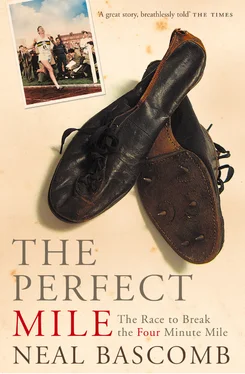1 ...7 8 9 11 12 13 ...21 But there he was at the opening ceremony, right in the middle of it all and wanting to prove he deserved to stand side by side with the best runners in the world. When the ceremony ended, the 5,870 athletes from sixty-seven nations filed out of the stadium, soaked and cold. Santee had only a few more days to pull himself together for his qualifying round. His legs had never failed him before, and no matter the obstacle or his state of mind, he expected them to see him through once again.
3
To be great, one does not have to be mad, but definitely it helps.
Percy Cerutty, Australian athletics coach
All was quiet in Kapyla, the Olympic village in a forest of pine trees twenty miles outside Helsinki. John Landy and three of his four room-mates – Les Perry, Don Macmillan, and Bob Prentice – lay in their iron-framed beds. The Arctic twilight crept in around the edges of the window, the sheets were as coarse as burlap, and the piles of track clothes and shoes reeked, but the Australians were resting easily, exhausted from being thousands of miles from home and trying to prepare for the most important athletics competition of their lives. In the days before an Olympian’s event, he felt as if he were looking over the edge of a cliff; the nerves, upset stomach, and general unease took a lot out of an athlete. The anticipation was almost as trying as the event itself. Sleep was the only relief on offer, if one could finally fall asleep.
‘Wake up! Wake up! You don’t need all this sleep!’ Percy Cerutty yelled as he burst into the room, swinging the door wide open and switching on the lights.
‘Bloody hell, Percy!’ groaned one of his athletes. ‘Thanks for waking us.’
‘You blokes don’t need all this sleep,’ their coach shouted back. At 57, Cerutty was a whirling dervish, a short, fit man with a flowing white mane of hair, goatee, toffee-coloured face, blue eyes, and the kind of voice that could wake the dead when raised. It was often raised.
‘All what sleep?’ his athletes retorted.
‘Ah, you’re hiding in here. You’re avoiding reality!’ Cerutty bounced around the floor, kicking up little wakes of cement dust. ‘The world is gathered here just outside that doorway, and all you fellas can think of is sleep. Sleep won’t get you anywhere.’ He was really getting going now. When Cerutty started a rant, he went on for a while. They had to stop him.
It might have been a single voice, but it was their collective annoyance that finally said, ‘Look, shut the hell up, Percy. It’s all right for you to wander around grandstanding, but we’re the ones who have to run. You’ve been carrying on non-stop since we got here, when all we’re trying to do is prepare to race. You’re supposed to be here to help us.’ Les Perry had to face the mighty Emil Zatopek; Bob Prentice would run a marathon; and Macmillan and Landy would toe the line with the greatest field of middle-distance runners in Olympic history. Cerutty had chosen to crash with his protégés, whether they liked it or not. They had been patient with him, but now he would have to excuse them for finally taking a stand against his antics.
After the athletes had joined him in London on 20 June (as an unofficial, non-sponsored coach, Cerutty had had to pay his own way and could afford the journey from Australia only by slow boat) for a series of pre-Olympic races, Cerutty had provoked incident after incident. They knew he needed to attract attention to promote his coaching techniques, but at what cost? Prancing around Motspur Park wearing only a pair of white shorts, he’d heckled other runners. At White City he had walked up to Roger Bannister, close enough to feel his breath, and said, ‘So, you’re Bannister … We’ve come to do you.’ He had showboated to the journalists, too. ‘Others can run faster,’ he’d boasted, ‘but none can run harder than I.’ He was dragged off screaming from one meet because he wouldn’t leave the track. On arriving in Helsinki, Cerutty had made a beeline to visit Paavo Nurmi without an invitation, and he had stayed so late with Zatopek that the Czech runner was forced to offer his bed to the Australian coach and sleep in the woods himself. His athletes were used to him, but couldn’t he have left his eccentricities in Australia? This was the Olympics. Enough was enough.
While Cerutty scrambled about the room, Landy and the others shielded their eyes from the light. Earlier that evening, Landy had scaled the fence surrounding the Olympic training arena to get in some extra training, so he was particularly tired. Compared to Don Macmillan, the miler in the bed next to him, who had long legs and a powerful chest, Landy was small. His 150lb were stretched over a narrow five-foot-eleven-inch frame, and with his quiet voice, soft brown eyes, and shag of curly hair, he hardly stood out in a room. Yet he had a strong presence. In part it was because of his intelligence, which was lively, well rounded, and quick. He also possessed a deep and infectious laugh. But mostly it was an intangible quality that people noticed, a feeling that Landy possessed a reservoir of calm, uncompromising will. In conversation with him, one immediately had the sense that he would be a rock in a storm, and that a friendship with him would endure.
Although Landy had been last on the list to make the Australian team, an honour that earned him a chance to compete but not the funds to make the trip, he had done very well in the six weeks since leaving Melbourne. In London he had placed second in the British AAA championship mile race – a surprise to himself and everybody else in the White City stadium. He’d followed that race with meets in Belfast, Glasgow, Middlesbrough, and another in London. Back home in Australia the press began to pay attention, commenting on his ‘paralyzing burst’ and how many experts ‘had not seen a runner over the last fifteen years with such relaxation, smoothness, and style’. He had even set a new two-mile record with a time of 8:54, a feat that resulted in his inclusion in the 5,000m heats on top of the 1,500m. It also improved the odds posted on him to bring back a medal. Now he just needed some sleep.
Landy and his three friends knew they owed their presence in Helsinki mainly to Cerutty, this madcap little man with his strange ideas about pushing oneself to the limit. After all, they were Cerutty’s gang. Unfortunately, enlightenment came at a cost.
To develop four Australian distance runners to Olympic standards had taken more than a sleep-deprivation regime. Unlike Finland, Australia wasn’t a country known for investing either attention or dollars in athletics. The six state amateur athletic associations ran perpetually in the red. Training methods were years behind European and American advances. Some Australians even thought too much exercise was bad for one’s health. As an athlete from the 1950s put it, ‘Runners were oddities; long-distance runners were very peculiar people; and those who ran the marathon were crazy.’ The country had a long tradition in track and field, but it was marked by neglect, a focus on gambling in professional foot races, lackadaisical training, a dearth of talent, and very little international success. Spectators and athletes alike had to pay at the gate, yet the expense of running meets consistently fell short of revenues. In promoter’s jargon, the sport ‘didn’t sell’.
Facilities for training and events were lacking as well. Australia, nearly the size of the continental United States, had only two standard athletics fields. One of those was in Melbourne, Landy’s hometown, but as Joseph Galli, a cigar-chomping, omnipresent athletics reporter of the time, wrote, ‘Olympic Park [was] a depressing shambles – lank grass covers the earth banking, dressing rooms are dirty and primitive, and the burnt-out stand remains as mute testimony of the unwillingness of Government and civic leaders to give amateur athletes the small, permanent stadium they need for the future.’ The track itself was a disaster; runners would have posted better times circling a potholed city block through rush-hour traffic.
Читать дальше












